Unit 5 Good manners Period 2 Reading 课件(87张PPT) 初中英语 译林牛津 八年级下册
文档属性
| 名称 | Unit 5 Good manners Period 2 Reading 课件(87张PPT) 初中英语 译林牛津 八年级下册 | 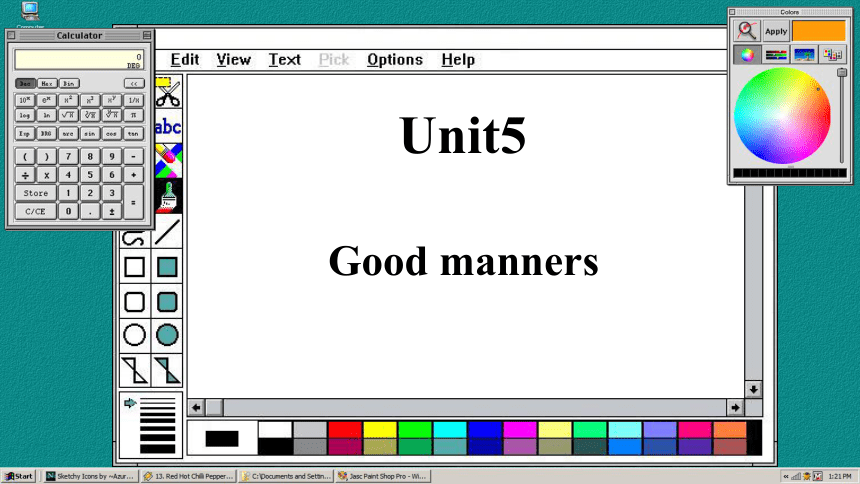 | |
| 格式 | pptx | ||
| 文件大小 | 2.5MB | ||
| 资源类型 | 教案 | ||
| 版本资源 | 牛津译林版 | ||
| 科目 | 英语 | ||
| 更新时间 | 2023-05-27 11:53:46 | ||
图片预览

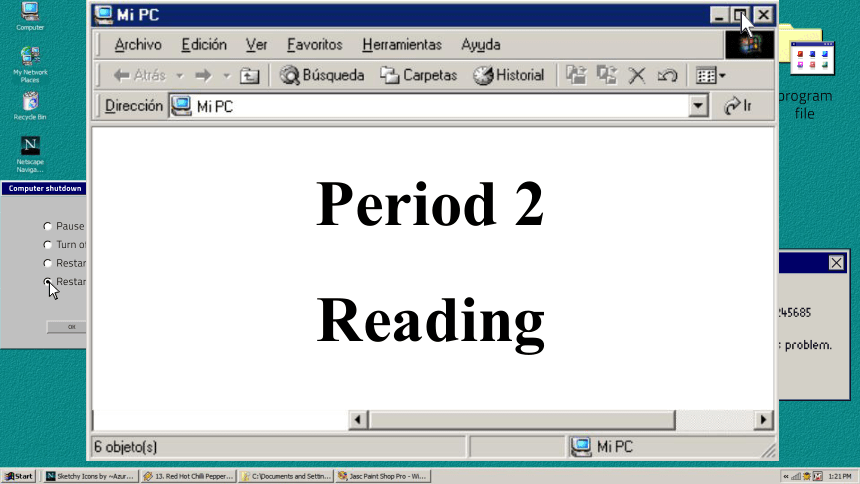
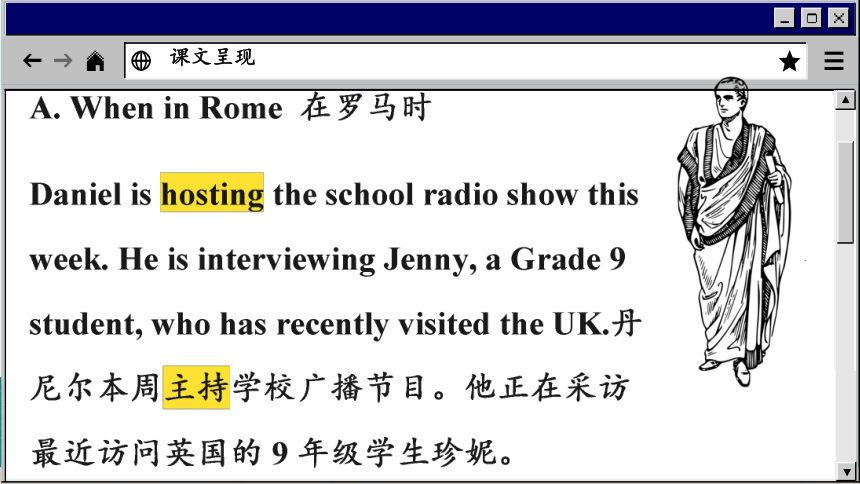
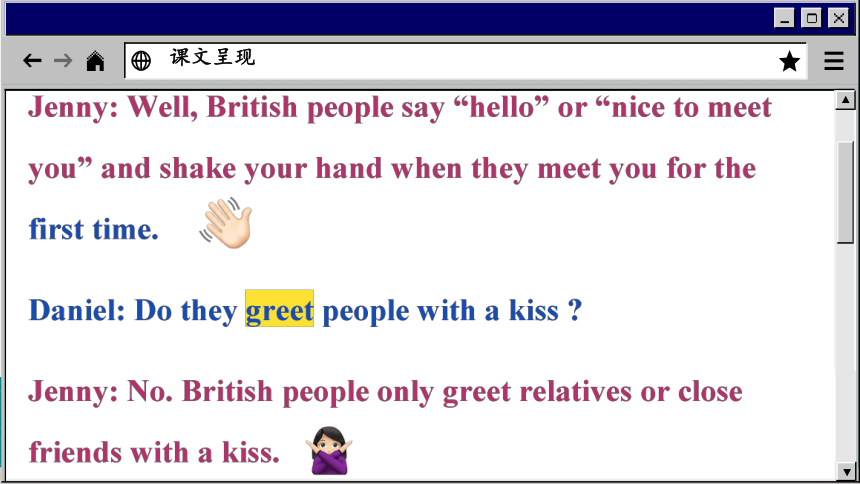
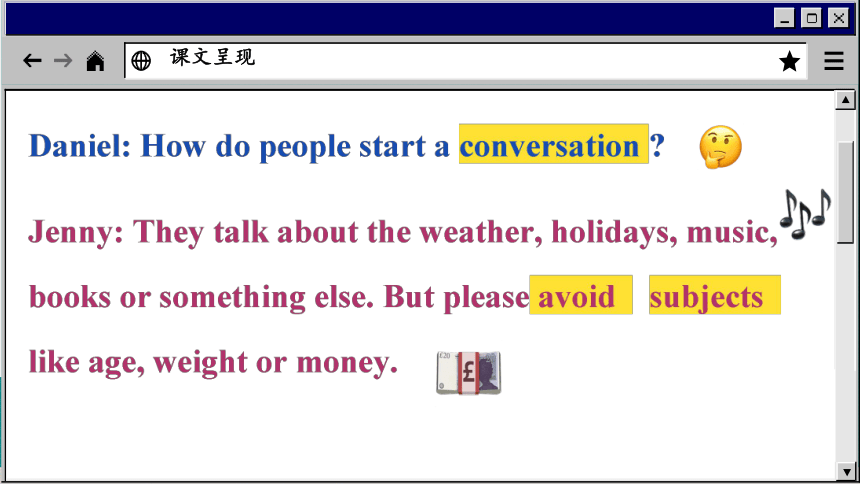
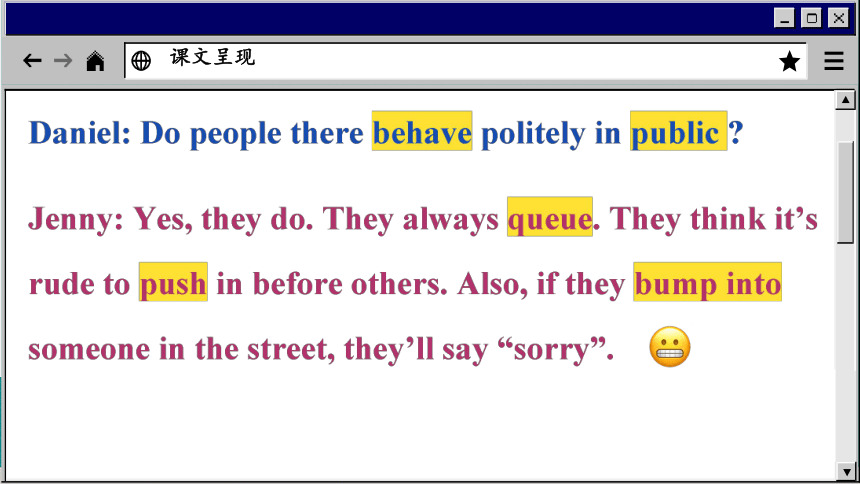
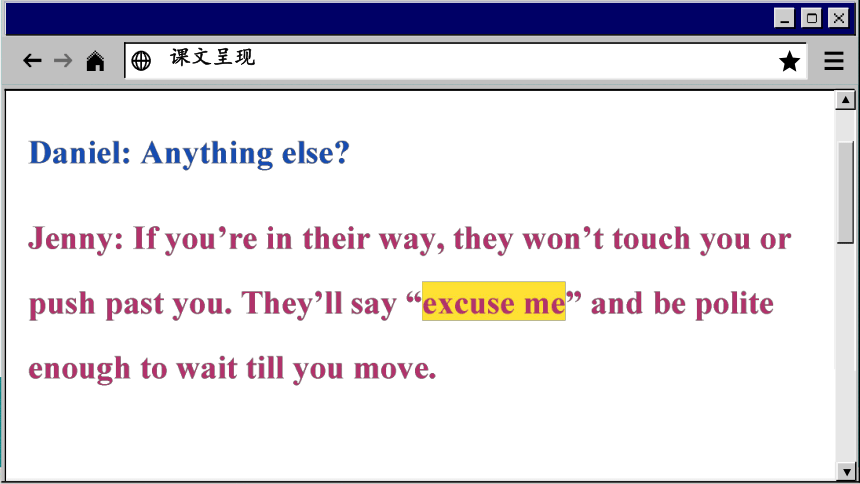
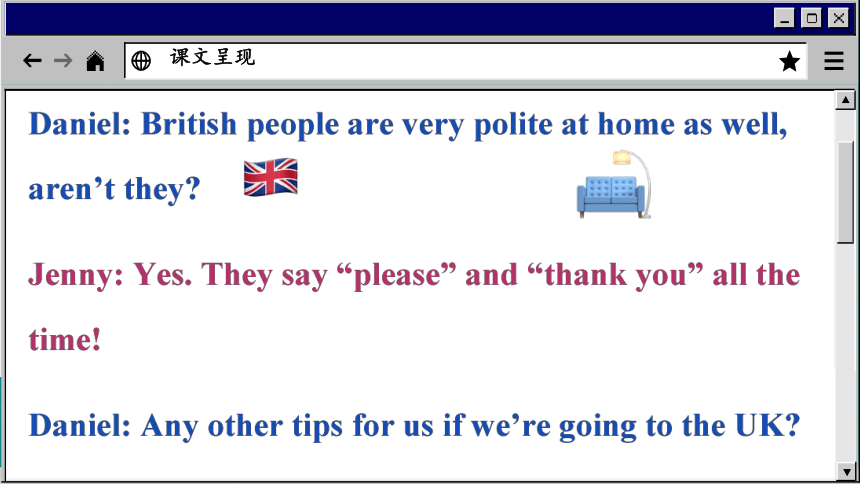
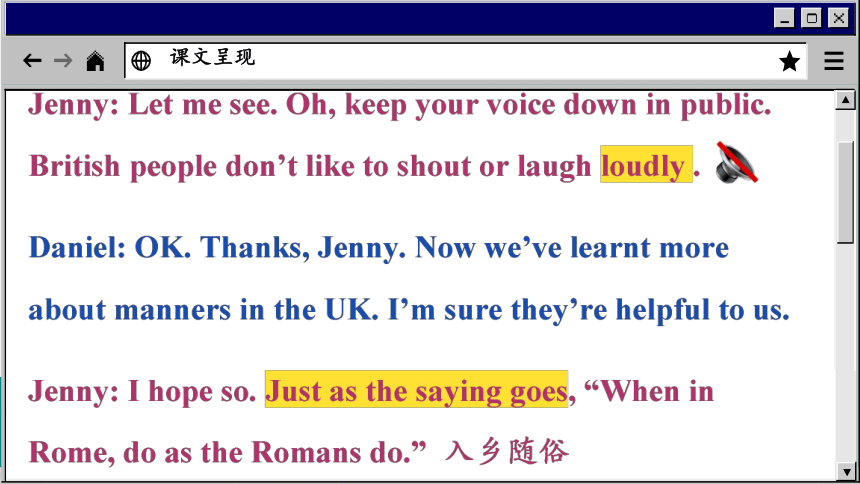
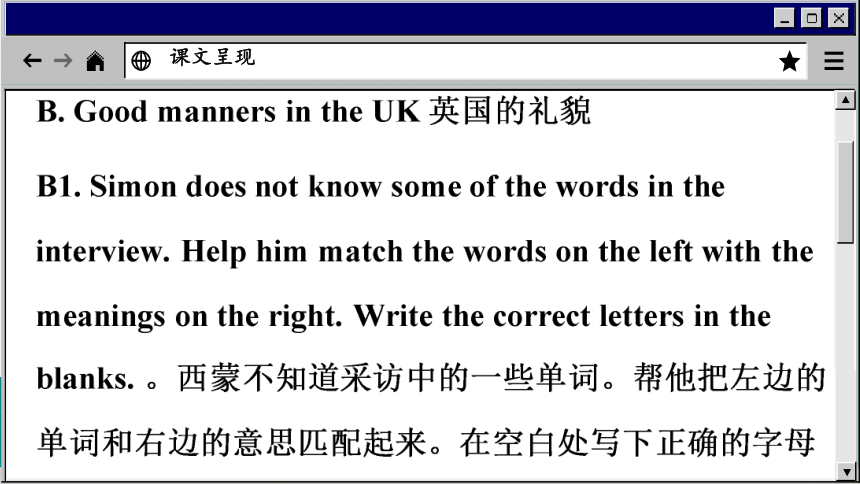
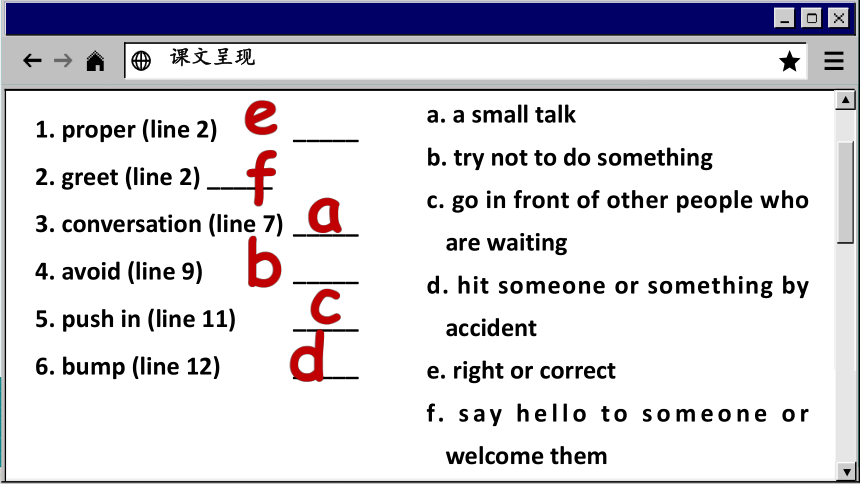
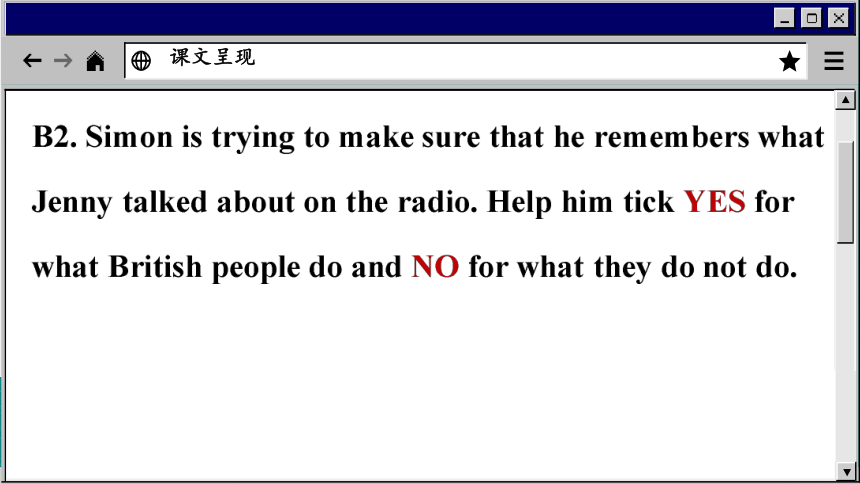
文档简介
(共87张PPT)
Unit5
Good manners
Period 2
Reading
1. proper (line 2) _____
2. greet (line 2) _____
3. conversation (line 7) _____
4. avoid (line 9) _____
5. push in (line 11) _____
6. bump (line 12) _____
a. a small talk
b. try not to do something
c. go in front of other people who are waiting
d. hit someone or something by accident
e. right or correct
f. say hello to someone or welcome them
√
√
√
√
√
√
√
√
√
√
√
√
√
√
√
√
√
shake your hand
relatives
They like to start a ____________ (3) with subjects like the weather, holidays, music or books. They __________ (4) talking about age, weight or money.
British people think it is rude to __________ (5) before others. They always __________ (6) . They say “sorry” if they __________ (7) you in the street. When they want you to __________ (8) , they say “excuse me”.
conversation
avoid
push in
queue
bump into
move
They do not like to shout or laugh loudly __________ (9) . British people are __________ (10) at home too. They say “please” or “thank you” ____________(11) .
“When in Rome, do as ____________ (12) do.” When we are in a strange place, we should do as the local people do.
in public
polite
all the time
the Romans
考点精讲
proper 的副词形式为properly,意为“恰当地;合适地”。
properly
亲吻
have a conversation with sb.
与某人进行一次谈话
“谈话”的英语表达是conversation;根据空格前的不定冠词a 可知,此处填conversation。
conversation
avoid 后接名词或动名词
避免
D
本题用固定搭配法。句意:在假期里,我们应该避免晚上熬夜和早上睡过头。avoid doing sth. 意为“避免做某事”,是固定搭配。
subject
民众, 群体
公开地,在别人面前
adj. 公开场合的,大庭广众的
句意:我们不能在公共场合吸烟。那样做对其他人有危害。in public 意为“在公开场合”,是固定短语。
ublic
v. 推,挤
n. 推,搡
A
本题用短语辨析法。push for 奋力争取;推动;care for 关心;look for 寻找;hope for 希望。根据常识可知,“一带一路”将成功推动中国与沿线国家的合作与发展。
挡住某人的路
A
v. 触动
D
劳驾
excuse me 常用的客套话。常用于句首, 通常在打扰别人或要吸引别人注意时使用。
sorry 常用于由于自己的过失给对方造成损失, 或对别人的要求不能满足时。
还可以用来表示对别人的病情、身体不适、处于困境等感到同情、伤心、难过。
xcuse
相当于too,是副词短语, 一般放在句末。
大声地,响亮地
loudly 只能作副词,意为“吵闹地”。
loud 可以作形容词,意为“大声的”,也可以作副词,意为“响亮地,大声地”,作副词时和loudly 同义。
aloud 只能作副词, 强调为使人听见而发声, 声音不一定很大,意为“出声地”。
oudly
正如, 如同
as 介词,“作为,以……身份”。
like 介词,“像……一样”。
偶然, 意外地
=by chance
by accident
课堂练习
touch
close
conversation
subject
pushed
touching
loudly/loud
British
weight
first
三、单项选择
11. — Would you please not speak so loudly in _______ public
—Sorry. I will remember to speak in ________ lower voice.
A. the; a B. /; a C. the; the D. /; /
B
C
用于肯定句的末尾,表示“也”,可以用as well或too。故选B。
B
C
本题用情景交际法。打扰别人时用excuse me;表示对别人的要求不能满足时用sorry。
D
in public
17. 令人惊讶的是,一些科学发现是偶然发现的。
Surprisingly, some scientific discoveries were made ________ ___________.
18. 在中国,老朋友见面时通常彼此握手。
In China, old friends usually ________ ________ _______ each other when they meet.
by accident
shake hands with
19. 去吧!没人挡你的路。
Go ahead! Nobody is ________ ________ ________.
20. 人们排队等公交车,如果你在前面插队的话,他们会不开心的。
People wait in line for buses and they will be unhappy if you ___________ ________ at the front.
in your way
push/cut in
Unit5
Good manners
Period 2
Reading
1. proper (line 2) _____
2. greet (line 2) _____
3. conversation (line 7) _____
4. avoid (line 9) _____
5. push in (line 11) _____
6. bump (line 12) _____
a. a small talk
b. try not to do something
c. go in front of other people who are waiting
d. hit someone or something by accident
e. right or correct
f. say hello to someone or welcome them
√
√
√
√
√
√
√
√
√
√
√
√
√
√
√
√
√
shake your hand
relatives
They like to start a ____________ (3) with subjects like the weather, holidays, music or books. They __________ (4) talking about age, weight or money.
British people think it is rude to __________ (5) before others. They always __________ (6) . They say “sorry” if they __________ (7) you in the street. When they want you to __________ (8) , they say “excuse me”.
conversation
avoid
push in
queue
bump into
move
They do not like to shout or laugh loudly __________ (9) . British people are __________ (10) at home too. They say “please” or “thank you” ____________(11) .
“When in Rome, do as ____________ (12) do.” When we are in a strange place, we should do as the local people do.
in public
polite
all the time
the Romans
考点精讲
proper 的副词形式为properly,意为“恰当地;合适地”。
properly
亲吻
have a conversation with sb.
与某人进行一次谈话
“谈话”的英语表达是conversation;根据空格前的不定冠词a 可知,此处填conversation。
conversation
avoid 后接名词或动名词
避免
D
本题用固定搭配法。句意:在假期里,我们应该避免晚上熬夜和早上睡过头。avoid doing sth. 意为“避免做某事”,是固定搭配。
subject
民众, 群体
公开地,在别人面前
adj. 公开场合的,大庭广众的
句意:我们不能在公共场合吸烟。那样做对其他人有危害。in public 意为“在公开场合”,是固定短语。
ublic
v. 推,挤
n. 推,搡
A
本题用短语辨析法。push for 奋力争取;推动;care for 关心;look for 寻找;hope for 希望。根据常识可知,“一带一路”将成功推动中国与沿线国家的合作与发展。
挡住某人的路
A
v. 触动
D
劳驾
excuse me 常用的客套话。常用于句首, 通常在打扰别人或要吸引别人注意时使用。
sorry 常用于由于自己的过失给对方造成损失, 或对别人的要求不能满足时。
还可以用来表示对别人的病情、身体不适、处于困境等感到同情、伤心、难过。
xcuse
相当于too,是副词短语, 一般放在句末。
大声地,响亮地
loudly 只能作副词,意为“吵闹地”。
loud 可以作形容词,意为“大声的”,也可以作副词,意为“响亮地,大声地”,作副词时和loudly 同义。
aloud 只能作副词, 强调为使人听见而发声, 声音不一定很大,意为“出声地”。
oudly
正如, 如同
as 介词,“作为,以……身份”。
like 介词,“像……一样”。
偶然, 意外地
=by chance
by accident
课堂练习
touch
close
conversation
subject
pushed
touching
loudly/loud
British
weight
first
三、单项选择
11. — Would you please not speak so loudly in _______ public
—Sorry. I will remember to speak in ________ lower voice.
A. the; a B. /; a C. the; the D. /; /
B
C
用于肯定句的末尾,表示“也”,可以用as well或too。故选B。
B
C
本题用情景交际法。打扰别人时用excuse me;表示对别人的要求不能满足时用sorry。
D
in public
17. 令人惊讶的是,一些科学发现是偶然发现的。
Surprisingly, some scientific discoveries were made ________ ___________.
18. 在中国,老朋友见面时通常彼此握手。
In China, old friends usually ________ ________ _______ each other when they meet.
by accident
shake hands with
19. 去吧!没人挡你的路。
Go ahead! Nobody is ________ ________ ________.
20. 人们排队等公交车,如果你在前面插队的话,他们会不开心的。
People wait in line for buses and they will be unhappy if you ___________ ________ at the front.
in your way
push/cut in
